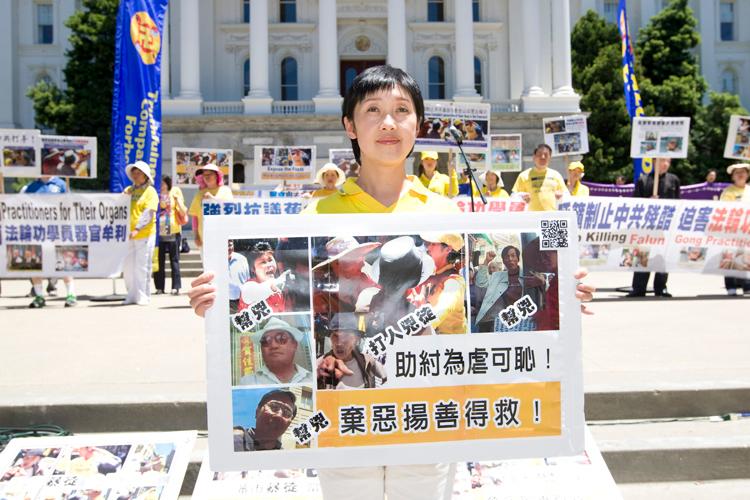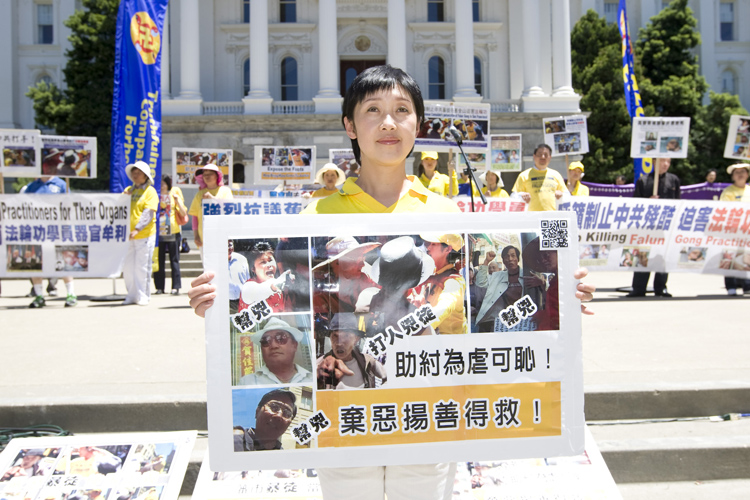SAN FRANCISCO—Ms. Dafang Wang is a Falun Gong practitioner living in San Francisco. Her kind eyes and warm smile can be frequently seen in Chinatown, where Dafang tells people about the persecution in China she and her family experienced beginning in 2001.
Dafang’s story began in 1999, when her job as a newspaper journalist engaged her in the task of secret investigations with the goal to find fault with Falun Gong. In her many interviews with Falun Gong practitioners, however, she instead grew to have a deeper, positive understanding of the practice.
Amongst her interviewees were scholars from Peking and Tsinghua Universities—the two leading institutes in China—who shared with her their experiences practicing Falun Gong.
Curious about why they practiced, she began to read the books of Falun Gong. She slowly came to recognize that in China, moral standards were very low and people would harm one another in order to fulfill their own selfish desires.
Falun Gong teaches people to practice truthfulness, compassion, and tolerance. The practice was like a street lamp that points out a path in the dark, Dafang realized.
“If everybody looked within and did things according to high moral standards when there is a conflict, then Chinese society would change fundamentally and be stable and peaceful,” she said.
Unfortunately, Dafang did not practice in peace for long. In July 1999, the persecution of Falun Gong began.
Dafang’s younger sister went to the capital Beijing to appeal to stop the persecution of Falun Gong and was illegally detained in August of 2001. She was sentenced to two years in a labor camp.
In December 2001, Dafang’s family was summoned and shown her sister’s dead body at the military hospital at the labor camp.
“Her hands were very swollen as if she were administered a lethal injection, but the guards insisted it was from a splinter,” Dafang said.
“Other practitioners who came back from the labor camp later told us that whenever they saw her, her face was covered with blood from being tortured,” she said. “It was very traumatizing for our whole family.”
The human rights suppression did not stop there. Dafang’s elderly parents in their 80s were regularly harassed by police, who frequented their home to pressure them.
The police demanded they renounce their faith in Falun Gong and sign a release to cremate Dafang’s sister, which would imply she died of natural causes. They rejected both demands.
After her sister’s death, Dafang also went to Beijing to raise awareness about the brutal persecution. When she was detained at the police station, she was beaten with four high voltage electric batons.
“Seven or eight people pulled me into a huge empty room, stepped on me, and shocked me with four electric batons tied together. They hit me everywhere—even on my head,” she said.
“When I was still conscious, I could feel myself bouncing on the floor from the electricity going through my body. My throat was so dry I could barely breathe. At that point I felt there was water on the floor. Later I realized I could not control my urine because of the torture,” she recalled.
After that, Dafang was transferred to another police station, where 49 policemen questioned her day and night. “At that point, standing on the floor, I felt like I was standing on cotton and could not remain straight,” she said.
“They asked me, ‘why did you come to Beijing?’ I said, ‘Before I came, I heard that 18 female Falun Gong practitioners were thrown into male prison cells to be gang raped in a prison in Shenyang. If your sister or mother or wife were among those 18 women, would you be able to stay at home? You certainly wouldn’t. You would feel that you were selfish. In a jail in Heilongjiang [Province], 15 practitioners were beaten to death in one day. If your family was among them, you would surely go to Beijing to talk with the central leaders you trust.’”
Dafang left China last year. “I came to the United States, thinking I was in a free land and can be safe. The sky is blue, and I can practice Falun Gong exercises freely, and talk openly about what is going on in China today and what happened to my sister.”
On June 10, however, Dafang was harshly grabbed by a man in a red shirt on the corner of Grant and Washington. At the time of the interview, more than two weeks later, large green bruises could still be seen on her arms.
“After I was grabbed, I was so sad this happened in America. I cried while holding banners that spoke out about the persecution in China. Some Chinese people passing by encouraged me and said, ‘Don’t cry; we know you are good people and truthfulness, compassion, and tolerance is good. But we are afraid to stand up to help you,’” Dafang said.
Chinatown locals told her that the people who attacked and hit Falun Gong practitioners on the streets were bribed by the Chinese Consulate to slander Falun Gong and cause a scene.
When asked why she continues to practice Falun Gong after going through such persecution, she calmly said, “When you realize deep in your heart that to be truthful—speak honestly, do honest things—compassionate, and tolerant—forbear even when others do you wrong, you feel happy every day and have a fulfilled life.”
The Epoch Times publishes in 35 countries and in 19 languages. Subscribe to our e-newsletter.





